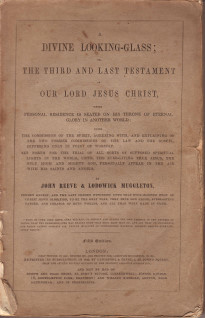 I I |
||
| Title | A Divine Looking Glass | |
| Author | John Reeve & Lodowick Muggleton | |
| Year of Publication | 1656, 1661, 1719, 1760 and 1846 | |
| Links | The 1846 edition may be found here | |
This volume is the major theological work of Muggletonianism,it appears to be mostly the work of John Reeve and it restates all the previous theological positions with added support and covers the major tenants of Muggletonianism, namely the physical nature of God, the nature of the angels, the nature of man, the two seeds, the commission and the natures of heaven and hell.
At chapter 7 verse 32 Reeve sets out in absolute terms the size of the heavenly bodies:
" My brethren, hearken no more unto vain astronomers, or star-gazers, concerning the bulk of the sun, moon and stars: for I positively affirm from the God that made them, that the compass of their bodies are not much more than they appear to our natural sight."
The work then goes on to explain at some length that each heavenly body "possess their own created light alone, neither borrowing nor lending their light to one another".
Chapter 9 sets out a key Muggletonian method for interpreting scripture, namely that you must concentrate on "positive scriptures" in order to interpret and understand "privative scriptures", at verse 5 it states:
"Therefore seeing all privative scriptures are of none effect, but in reference unto those which are positive"
At chapter 24, verse 36 a certain knowledge of recent history is exhibited by an acknowledgement of the claims of Bull and Farnham to be the two witnesses spoken of in Revelation, a claim that they differentiate from their own rightful claim. A print from The Lives and Portraits of Remarkable Characters published in 1819 concerning Farnham & Bull can be seen here.
The acceptance of Gods election and the outcome of the battle within each person of the two seeds over any voluntary act of repentance has always been of a vaguely Calvinist belief but a rejection of hyper Calvinism is clear in chapter 39 verse 3 where it states that:
"eternal election or rejection, spoken of in holy writ, had relation only to persons of understanding, and not unto children that were incapable of any distinction between light and darkness, or good and evil."
Arice Evans who is referred to at chapter 41 verse 11 is presumably the minor but interesting historical figure Arise Evans who was a pro-monarchist poet and mystic. I find it hard to see how Muggleton could maintain his claims to be a prophet in view of Reeve's statement at chapter 46 verses 2 and 3 that:
"From an unerring spirit, to this I answer, as John the Baptist was the last prophet under the law, and the forerunner of the sudden appearing of Christ Jesus the Lord in a body of flesh, So likewise, I positively affirm against all gainsayers that I, John Reeve, am the last commissioned prophet that ever shall declare divine secrets, according to the foundation of truth, until the Lord Jesus Christ appear on his throne of glory, visibly to be seen by all the elect, face to face."
No copies of the original 1656 text have survived, and indeed in the "Acts of The Witnesses" Muggleton records a great dissatisfaction with that edition at chapter 4 verse 27:
"But the printer being knavish and covetous, quite spoiled it in the press, he hudled it up so close together, for want of more paper, that nobody had any delight to read it through, so that it never yielded the mony it cost to print"
The work was altered slightly by Muggleton for the 1661 printing, chiefly to remove the glowing reference to Cromwell which was no longer wise due to the restoration as well as what some saw as strengthening his own position. the changes are set out in T L Underwood's collection of Muggletonian works. this caused a great deal of fuss when in the 1800's the Frost brothers saw any use of the 1760 edition of this volume, which was based on the original 1656 document, to be an attempt to deprive Muggleton of his authority. A rather clumsy attempt to enforce this line was rather embarrassingly defeated by the poor but saintly Thomas Robinson. This was embarrassing for the Frosts as they inadvertently incorporated the 1760 edition in their 1831 collected works, an error that led them to seek to amend the copy of that volume held at the British Library (the documents relating to this attempt may be found here).